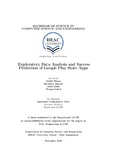| dc.contributor.advisor | Chakrabarty, Amitabha | |
| dc.contributor.author | Mueez, Abdul | |
| dc.contributor.author | Ahmed, Khushba | |
| dc.contributor.author | Islam, Tuba | |
| dc.contributor.author | Iqbal, Waqqas | |
| dc.date.accessioned | 2019-02-13T06:28:43Z | |
| dc.date.available | 2019-02-13T06:28:43Z | |
| dc.date.copyright | 2018 | |
| dc.date.issued | 2018-12 | |
| dc.identifier.other | ID 15101108 | |
| dc.identifier.other | ID 15101020 | |
| dc.identifier.other | ID 15141002 | |
| dc.identifier.other | ID 15101109 | |
| dc.identifier.uri | http://hdl.handle.net/10361/11407 | |
| dc.description | This thesis is submitted in partial fulfilment of the requirements for the degree of Bachelor of Science in Computer Science and Engineering, 2018. | en_US |
| dc.description | Includes bibliographical references (pages 64-65). | |
| dc.description | Cataloged from PDF version of thesis. | |
| dc.description.abstract | Mobile app distribution platform such as Google play store gets flooded with several thousands
of new apps everyday with many more thousands of developers working independently
or in a team to make them successful. With immense competition from all over the globe, it
is imperative for a developer to know whether he is proceeding in the right direction. Unlike
making a movie where presence of popular celebrities raise the probability of success even
before the movie is released, it is not the case with developing apps. Since most Play Store
apps are free, the revenue model is quite unknown and unavailable as to how the in-app
purchases, in-app adverts and subscriptions contribute to the success of an app. Thus, an
app’s success is usually determined by the number of installs and the user ratings that it has
received over its lifetime rather than the revenue it generated. In this thesis, on a smaller
scale, we have tried to perform exploratory data analysis to dive deeper into the Google Play
Store data that we collected, discovering relationships with specific features such as how the
number of words in an app name for instance, affect installs, in order to use them to find
out which apps are more likely to succeed. Using these extracted features and the recent
sentiment of users we have predicted the "success" of an app soon after it is launched into
the Google Play Store. | en_US |
| dc.description.statementofresponsibility | Abdul Mueez | |
| dc.description.statementofresponsibility | Khushba Ahmed | |
| dc.description.statementofresponsibility | Tuba Islam | |
| dc.description.statementofresponsibility | Waqqas Iqbal | |
| dc.format.extent | 65 pages | |
| dc.language.iso | en | en_US |
| dc.publisher | BRAC University | en_US |
| dc.rights | BRAC University theses are protected by copyright. They may be viewed from this source for any purpose, but reproduction or distribution in any format is prohibited without written permission. | |
| dc.subject | Mobile app | en_US |
| dc.subject | Google | en_US |
| dc.subject | Play store | en_US |
| dc.subject.lcsh | Mobile apps. | |
| dc.title | Exploratory data analysis and success prediction of Google Play Store apps | en_US |
| dc.type | Thesis | en_US |
| dc.contributor.department | Department of Computer Science and Engineering, BRAC University | |
| dc.description.degree | B. Computer Science and Engineering | |

